
Roxanne Maduro ’17, an Environmental Sciences major from Bronx, N.Y., (third from left) is one of four łÉČËÍ·Ěő students participating in CMUDE 2015 as a judge
Editor’s note: łÉČËÍ·Ěő students are in Bogota, Colombia at CMUDE, a Spanish debate competition. This post appeared originally on the . See more .
Debating is not easy. You have 15 minutes to prepare a persuasive and informed argument on a topic you may or may not know and then another seven to speak about it, all while attempting to sound confident in a claim that you may not necessarily believe in, but have to prove to be true nevertheless.
If you are told your position is to prove that 2+2=5, your job is to make the judges and the opposition feel like they are complete fools for ever having believed otherwise. I hold extreme respect for students who challenge themselves by debating, especially those in our team, who not only have to debate, but do it in another language.
While I admit that debating is hard, the alternative — judging a debate — is not easy either. Debating and judging are both very difficult for different reasons, and require different skill sets to be successful. If you are a great debater, you can still turn out to be a terrible judge, and vice versa.
The role that proves to be harder varies by individual. People who are very quick on their feet and love to challenge others’ opinions without having to consider the other side of things most likely would be great debaters but terrible judges.
Although some people have traits that predispose them to be a good judge, there are techniques and ways of thinking for particularly exceptional judges. To begin, you have to train yourself to be very detail oriented because the smallest nuance that you notice in an argument can have a large impact on the results of a debate. After that, it’s all in the notes.
When I started out as a judge, I was a mess. I would sit and take very careful and tedious notes during the debates that I judged, but when it came time to deliberate, I had absolutely nothing to say. By the end of the fourth round, it reached the point where I was the head judge and was the person that said the least out of the three panelists. I couldn’t figure out what I was doing wrong.
Eventually, I decided to look over my notes for the last four rounds, and just like that, I found the problem. I was taking notes like a debater. I wrote down the arguments, rebuttals, and anything else of importance in the speech itself, but did nothing to actually analyze what was being said, what points were stronger, and most importantly, the interaction between the arguments of opposing debaters.
I realized then that judging was twice as hard as debating in terms of note taking. Like debaters, you should keep track of arguments and rebuttals, but you also have to see which arguments are stronger, whether another team responded to the argument, if it was a sufficient response, whether points were elaborated upon, whether teams fulfilled their roles, and so much more.
The strongest teams are always those that make the strongest arguments, develop them, and destroy the bases of each opposing argument, point by point. A judge has to try to be as objective as possible and not hold any bias toward a motion or a debater. This wouldn’t be so bad if it were not for the fact that we’re not even allowed to laugh at a humorous comment or an entertaining debate in general, because judges are supposed to be as non-interferential as possible, and laughing could possibly distract from the debate.
I think that everyone, if given the chance, should debate at one point or another in their lives, because it has so many benefits with regards to reasoning, logic, and public speaking in general. But on a deeper level, judging has helped me begin to develop a new mindset and critical viewpoint that I would not have had if I just debated.
Being able to judge in for this past week has allowed me to collaborate with students and professors who have years of experience as panelists, meet dozens of different teams from around the world, and most amazingly, learn from the vastly different experiences and lessons that my fellow łÉČËÍ·Ěő teammates and I were able to go through in the exact same tournament.
Roxanne Maduro ’17.
